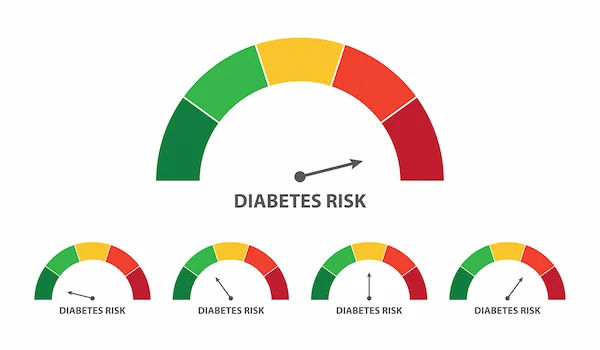Black Blood During Periods: Understanding, Causes, and When to Seek Help
Concerned about black blood during your period? Learn about potential causes, including hormonal imbalances, endometrial polyps, and pelvic inflammatory disease. Understand when to seek medical attention for this concerning symptom.

Written by Dr.Sonia Bhatt
Last updated on 13th Jan, 2026

Menstrual blood can vary in colour throughout the menstrual cycle. While red is the most common colour associated with menstruation, black blood can sometimes appear during periods. This can cause concern for many women, but in most cases, it is not a sign of something serious. This article will delve into what black blood during periods means, its causes, and when to seek medical attention.
What is Black Blood During Periods?
Black blood during periods usually indicates older blood that has taken longer to exit the uterus. The dark colour results from oxidation, a natural process in which blood reacts with oxygen over time. When blood takes longer to leave the body, it has more time to oxidise and turn dark brown or black. While this might look concerning, it's often a normal part of the menstrual cycle.
When can Black Blood During Periods be Normal?
Black blood during periods can often be perfectly normal. Here are some scenarios where this may be the case:
End of the Menstrual Cycle: Towards the end of your period, the blood flow slows down, and the blood takes longer to leave the body. This oxidation process can cause the blood to appear dark brown or black.
Delayed Periods: If your period arrives late, the blood may have had more time to oxidise and turn a darker colour.
Lochia: After childbirth, it's normal to experience black discharge as the body expels the remaining blood and tissue, known as lochia.
Hormonal Changes: Minor hormonal fluctuations can sometimes lead to changes in the colour of menstrual blood.
Menstrual Products: Sometimes, using certain menstrual products can slow down the flow, causing the blood to oxidise and darken.
As long as you’re not experiencing any discomfort or other unusual symptoms, black period blood is typically nothing to worry about. However, if you have any concerns or notice other symptoms, it’s always a good idea to consult with a healthcare provider.
When Should You Be Concerned About Black Blood?
While black period blood is often normal, there are certain situations where it could indicate an underlying issue that requires medical attention. Here are some instances when you should be concerned about black blood:
Severe Pain or Discomfort: If you experience intense pain or cramping along with black discharge, it could be a sign of a more serious condition.
Heavy Bleeding: If the black blood is accompanied by unusually heavy bleeding, it may indicate a problem that needs to be addressed.
Unusual Odor: A foul or strong odour can be a sign of infection or other health issues.
Sudden Changes in Menstrual Cycle: Any sudden changes in your menstrual cycle, including the appearance of black blood, should be discussed with a healthcare professional.
Other Symptoms: If you notice additional symptoms such as fever, fatigue, or unusual discharge, it could be a sign of an infection or other medical condition.
Potential Health Concerns Associated with Black Period Blood
While black period blood is usually safe and can be a natural part of your menstrual cycle, there are some health concerns that you should be aware of. Recognising these concerns can help you determine when to seek medical advice.
1. Infections
Black blood or discharge with a strong odour along with symptoms such as fever, itching, or discomfort may indicate an infection. Bacterial vaginosis and pelvic inflammatory disease are examples of infections that can cause abnormal discharge and should be treated promptly to prevent complications.
2. Miscarriage
Black or dark brown blood during pregnancy could be a sign of a miscarriage or an ectopic pregnancy. It’s crucial to seek immediate medical attention if you experience heavy bleeding, severe pain, or dizziness while pregnant.
3. Retained Menstrual Blood
In some cases, a foreign body (such as a forgotten tampon) or structural abnormalities (like cervical stenosis) can obstruct the normal flow of menstrual blood, causing it to remain in the uterus for a long time and turn black. This can also cause infections if not addressed timely.
4. Endometriosis
Endometriosis is a condition where tissue similar to the lining of the uterus grows outside of it, resulting in abnormal bleeding patterns, including black period blood, along with severe pain and other symptoms. If you suspect endometriosis, consult a healthcare provider for proper diagnosis and treatment.
5. Hormonal Imbalances
Conditions such as polycystic ovary syndrome (PCOS) or thyroid issues can disrupt your hormonal balance, leading to irregular periods and changes in menstrual blood colour. Black period blood could be a sign that your hormones are not in balance.
6. Cervical Cancer
Though rare, black blood can sometimes be an indication of more serious conditions like cervical cancer. If you experience black discharge along with other symptoms such as unexplained weight loss, fatigue, or pelvic pain, it’s important to get screened by a healthcare professional.
How to Manage Black Period Blood
Experiencing black period blood can be truely concerning, but there are the ways to manage it effectively. Here are some tips to help you navigate this:
1. Maintain Good Hygiene
Regular Changing: Change your sanitary products (pads, tampons, or menstrual cups) regularly to prevent infections.
Gentle Cleansing: Use gentle, unscented soaps to clean your genital area. Avoid douching as it can disrupt the natural balance of bacteria and cause infection.
2. Track Your Menstrual Cycle
Period Tracking Apps: Utilize apps to monitor your cycle and identify any irregularities or changes in blood colour.
Symptom Journal: Keep a record of any unusual symptoms, such as the appearance of black blood, to discuss with your healthcare provider.
3. Stay Hydrated and Eat a Balanced Diet
Hydration: Drinking plenty of water can help keep your body functioning smoothly and potentially reduce the occurrence of clots and dark blood.
Healthy Diet: Incorporate fruits, vegetables, whole grains, and lean proteins into your diet to support hormonal balance and overall health.
4. Manage Stress
Relaxation Techniques: Practices such as yoga, meditation, and deep breathing can help manage stress, which can, in turn, affect your menstrual cycle.
Regular Exercise: Engage in regular physical activity to help regulate your periods and alleviate menstrual symptoms.
5. Know When to Seek Medical Advice
Consult a Healthcare Provider: If you notice black blood along with severe pain, heavy bleeding, unusual odour, or other concerning symptoms, it’s important to seek medical advice.
Routine Check-Ups: Regular gynaecological check-ups can help detect and address any potential issues early on.
6. Understand Your Body
Education: Learn about your menstrual cycle and what changes to expect. Understanding your body can help you differentiate between normal variations and potential concerns.
Communication: Don’t hesitate to talk to your healthcare provider about any questions or concerns you may have regarding your menstrual health.
Conclusion
Black Blood During Periods, while unexpected, is usually a normal variation in menstrual health. It often indicates old blood that has oxidised as it took longer to exit the body. Understanding the common causes, such as the end of the menstrual cycle, delayed periods, or postpartum changes, can help alleviate concerns. However, it’s crucial to recognise when black blood might signal an underlying issue, such as infections, hormonal imbalances, or more serious health conditions. By maintaining good menstrual hygiene, tracking your cycle, managing stress, and seeking medical advice when necessary, you can effectively manage your menstrual health. Staying informed and attentive to your body’s signals is key to ensuring overall well-being. If you ever experience any unusual symptoms or have concerns, don’t hesitate to consult with a healthcare professional.
Consult Top Gynecologist
Consult Top Gynecologist

Dr. Amit Choraria
Surgical Oncologist
18 Years • MBBS, MS (Surgery) Fellow, Surgical Oncology, Tata Medical Center (FSO) Fellow, European Board of Surgery (Surgical Oncology) (FEBS) Fellow, Minimal Access Surgery (FMAS) Fellow, Indian Association of Gastrointestinal Endosurgeons (FIAGES) UICC Fellow, Royal Marsden NHS, London, UK Visiting Scholar, Plastic Reconstructive Surgery, CGMH, Taiwan Fellow, Robotic Surgical Oncology, Vattikuti Foundation, USA
Kolkata
Apollo Multispeciality Hospitals , Kolkata, Kolkata
(75+ Patients)

Dr. Kumar Gubbala
Gynaecological Oncologist
7 Years • MBBS, MRCOG
Chennai
Apollo Proton Cancer Center, Chennai
(25+ Patients)

Dr. V R N Vijay Kumar
Surgical Oncologist
9 Years • MBBS, MS (Gen. Surg.), DNB (Surg. Onco.)
Ahmedabad
Apollo Hospitals Gandhinagar, Ahmedabad

Dr. Swati Shah
Surgical Oncologist
15 Years • DNB Surgical Oncology, certified Robotic Cancer Surgeon
Ahmedabad
Apollo Hospitals Gandhinagar, Ahmedabad
(25+ Patients)

Dr Bhawna Garg
Gynaecological Oncologist
26 Years • MBBS, MS, (PGI MS ROHTAK) FELLOWSHIP GYNECOLOGY ONCOLOGY, (CANCER INSTITUTE CHENNAI)
Delhi
Apollo Hospitals Indraprastha, Delhi



